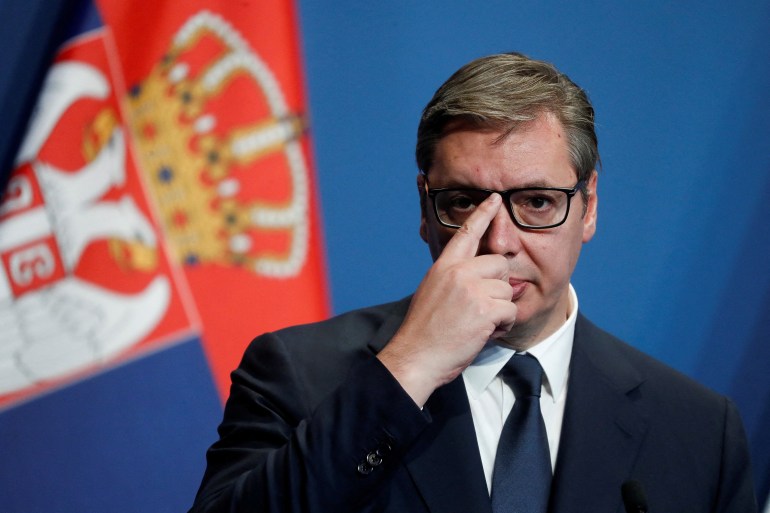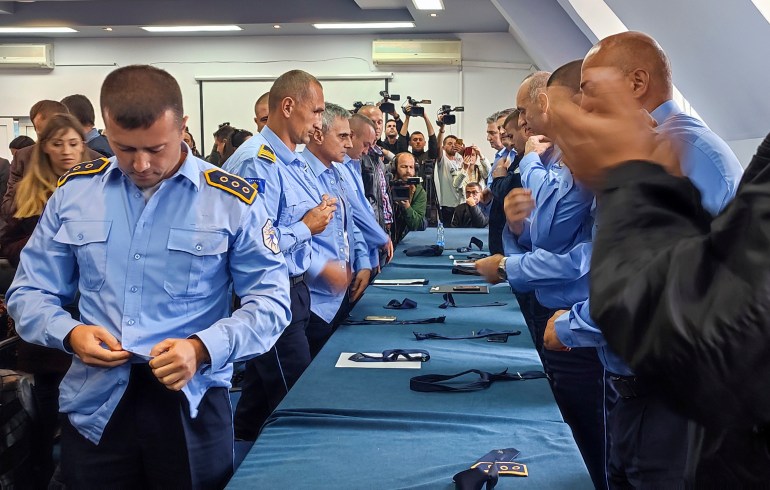Serbian president said he was under ‘no illusion’ that NATO would agree to his request amid tension in northern Kosovo.
Serbia will ask NATO peacekeepers to let it deploy Serbian military and police to volatile northern Kosovo, although it believes there is no chance of the request being approved, Serbian President Aleksandar Vucic has said.
The European Union’s foreign policy chief Josep Borrell warned last month of the potential for “escalation and violence” after emergency talks between Kosovo and Serbia failed to resolve their long-running dispute over car licence plates used by the ethnic Serb minority in Kosovo.
The proposal by Belgrade to send its forces to the former Serbian province — and now independent Kosovo — could escalate already seething tensions in the Balkan states.
Vucic told a news conference on Saturday in Belgrade that he would make the request to deploy Serbian forces in a letter to the commander of NATO’s KFOR mission, the alliance’s peacekeeping force in Kosovo.
“We will request from the KFOR commander to ensure the deployment of army and police personnel of the Republic of Serbia to the territory of Kosovo and Metohija,” Vucic said, adding that he had “no illusions” that the request would be accepted.

The request to NATO would be the first time Belgrade has sought to deploy troops in Kosovo under the provisions of a UN Security Council resolution which ended a 1998-1999 war and in which NATO interceded against Serbia to protect Albanian-majority Kosovo.
The resolution said Serbia could deploy up to 1,000 military, police and customs officials to Orthodox Christian religious sites, areas with Serb majorities and border crossings, if such a deployment is approved by KFOR’s commander. At the time of the resolution, Kosovo, which declared independence in 2008, was still recognised as part of Serbia.
Belgrade, supported by Russia and China, has refused to recognise Kosovo’s statehood.
NATO still has about 3,700 peacekeepers stationed in the former Serbian province to prevent violence between ethnic Albanians and Serbs.
‘Destabilise the region’
Kosovo Prime Minister Albin Kurti’s office said the move by Serbia would be “an act of aggression” and an indication of “Serbia’s tendencies to destabilise the region”.
Vucic’s remarks come after a spate of incidents and growing tension between Kosovo authorities and Kosovo Serbs who constitute a majority in northern areas of Kosovo.
On Saturday, Kosovo Serbs exchanged gunfire with police officers in the volatile north, and Kosovo’s President Vjosa Osmani announced that local elections scheduled for December 18 in the area would be delayed until next year.
The gunfire broke out after Serbs blocked main roads in the northern region to protest against the arrest of a former member of the Kosovo police who quit his post last month along with other ethnic Serb officials.
Authorities in Pristina said former policeman Dejan Pantic was arrested for allegedly attacking election commission offices, police officers and election officials on Tuesday.
Serb mayors in northern Kosovo municipalities, along with local judges and some 600 police officers, resigned last month in protest over a government decision to replace Belgrade-issued car license plates with ones issued by Pristina.

Police said the blockade on Saturday halted traffic, and they were forced to close two border crossings between Kosovo and Serbia. Later, they said they came under fire in several locations close to a lake bordering Serbia. There were no immediate reports of injuries.
In an effort to defuse tensions, Kosovar President Osmani announced the postponement until April 23 of local elections in the northern municipalities of Mitrovica, Zubin Potok, Zvecan and Leposavic.
The EU has also warned both Serbia and Kosovo to resolve their disputes peacefully and to normalise relations if they want to be considered eligible for membership in the bloc.


